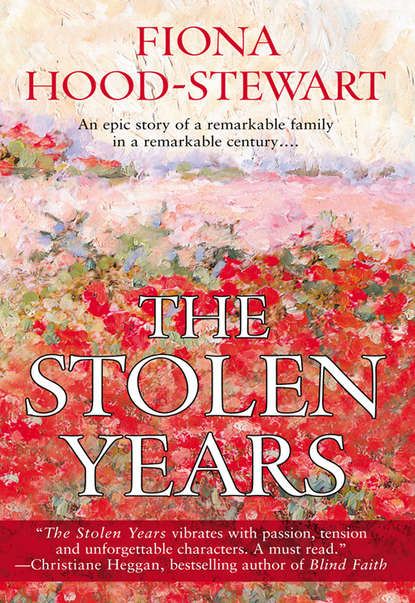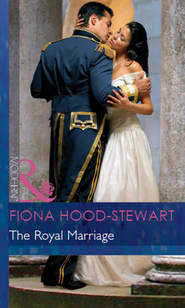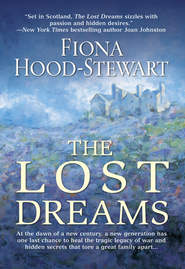По всем вопросам обращайтесь на: info@litportal.ru
(©) 2003-2024.
✖
The Stolen Years
Автор
Год написания книги
2018
Настройки чтения
Размер шрифта
Высота строк
Поля
Exercising every ounce of self-control, he stayed silent, dealing with the shock. The pain in his thigh increased, like sharp dagger thrusts.
“I’m sorry, Gavin,” Miles repeated, his voice icy, and for a second, as the car swerved onto a road that led to the forest, Gavin wanted to kill them both.
But a decision on their final destination had to be reached, and there was no time to grieve. Miles suggested the Swiss border again.
“It’s too obvious,” Franz replied, shaking his head. “We’ve only got a head start of a couple of hours before they’ll be on to us. I reckon we should go to Schloss Annenberg. It’s a small hunting lodge that belongs to my father’s family. At the beginning of the war we stocked it with provisions in case we needed to hide. My father was worried that my mother, being British, and my sister, might find themselves in danger. Nobody has lived there for years. It’s tucked away in the depths of the woods.”
“Where the hell are we, anyway?” Gavin asked, trying to escape the images of Annelise’s body sinking to the ground.
“Slightly south of Frieburg, I reckon.” Miles leaned across the dashboard and opened the glove box of the Daimler. Sure enough, a map lay neatly folded inside. He handed it to Franz, who opened it and began studying it. “We’ll have to head farther south. Now we’re going east. At the next crossroads, we’d better make a right.”
“How do you think your parents are going to take the news that you’ve deserted?” Gavin asked evenly, directing his anger at Franz.
“It will be a blight on the German half of the family, but I know my parents will understand. They know I feel more British than German and would rather be fighting for the other side.”
“Isn’t home the first place the Germans will look for you?” he asked scathingly.
“Perhaps they’ll go to the house in Hanover, but not to Annenburg. They will advise my family. The news will travel fast. But they’ll imagine we’re trying to reach the British lines or the border. And right now they’re too busy to spend much time looking for deserters. It’s my father I’m sorry about.” Franz looked away, his face bleak. “But I don’t believe in this war, and neither does he. I don’t believe in what Germany’s doing, in all the massacres that have taken place, and now this expansionist vision of Ludendorff’s. He thinks he can reinstate German culture in the Baltic states and Russia, and I don’t want to be a part of any of it. My sister and I were raised in London and I’ve always considered myself British. I can’t change that now.”
“Why didn’t you fight with us, then?” Gavin challenged, noticing that the forest had thickened and the road narrowed.
“The ironic part is that, if I’d offered my services to the British, they would merely have taken me for a spy, and I’d have spent the rest of the war rotting in a damn prison camp.” Franz sighed. “Of course, you chaps will want to get back as quickly as you can.” Turning, he glanced at Gavin as the car rattled over a particularly bumpy stretch of road. His eyes narrowed. “Your leg is hurting, isn’t it? You can’t go anywhere until you get well, or you’ll be caught immediately and expose the lot of us.”
“Maybe you should finish me off, like Annelise. After all, I’m a liability.”
“Don’t be ridiculous,” Miles snapped savagely as they began climbing a small road that wound its way farther into the forest, now a dense mix of dark, heavy branches.
He peered through the windshield at the drizzling rain that was making progress increasingly difficult. Gavin tried to change positions as the pain in his thigh grew more excruciating.
Just as they reached the top of the hill, the car jolted to a sudden stop, the bonnet tipped forward and the front wheels sank deep into a rut.
“Bloody hell,” Miles swore. Trying to rev up the engine, he succeeded only in producing a screeching of tires as they rotated in the mud.
“What rotten luck,” Franz exclaimed. “We’re not far from Schloss Annenberg now, only about twelve kilometers.”
Miles tried again, then threw up his hands, irritated. “It’s no use. I’m just making matters worse.”
A few straggling houses, their pointed roofs peering out from above the trees, formed a hamlet bordering the roadside about a kilometer down the road. “Do you think we should try and get help?” he asked Franz uneasily. “God knows what will happen if we’re found here by the wrong people.”
“We have to be very careful,” Franz replied, jumping out and avoiding the worst of the sludge. “It’s just near enough to Schloss Annenberg for someone to remember me, although I haven’t been here in years, so it’s doubtful. But you never know, and people can be very treacherous in a war. We cannot trust anyone to protect us.” He glanced at the cottages. “We can’t risk them seeing you wounded, Gavin. We’re too far from the front and your rank is too high for anyone to believe that you would not have been immediately transported to a field hospital. We must hide you.” He glanced at the forest, frowning.
Miles gave the engine a last try, then admitted defeat. “I think the village is our only chance.”
“Franz, you’re right.” Gavin gritted his teeth. “The blood on my uniform will make them suspicious.” He was feeling faint and wondered how long he could hold out. “I’d better get away from the middle of the road.” He glanced at the forest on either side of them “I’ll get into the forest and you two go find help together.” He began heaving himself out of the vehicle while Franz steadied him.
“Think you can manage?”
“Of course.” Gavin tried his best to walk straight. “I’ll make it. It’s not far. Now get going. And if for some reason you can’t make it back…well, for God’s sake, just go.”
Miles handed him a knife. “Better have this—just in case.”
“You might need it yourself.” Gavin gazed at it in horror, his stomach lurching at the sight of the tiny red specks of blood, still fresh on the flashing blade. He thought of Annelise’s blue eyes and silver-blond hair, and anger returned in a rush. But he was too weak to do more than hope he’d make it to the trees.
Reluctantly, he took the knife and pocketed it. “Good luck.”
Franz slipped his hand into his jacket pocket and took out a handkerchief, which he handed to Gavin. “I’ve had this since the beginning of the war. My mother embroidered it for me right before I came out, and it’s brought me luck. If, for some reason, we get separated, you can always try and reach my parents’ home in Hanover.” He quickly wrote down the address. “Give the hankie to my mother and tell her I said to hug Bubbles for me. She’ll understand. Don’t argue, we haven’t time. Just take it.” He thrust the address and the white linen handkerchief into Gavin’s hand. Their eyes met, then Franz turned and he and Miles trudged off, squelching through the ankle-deep mud toward the hamlet.
Gavin glanced at the initials exquisitely embroidered by a loving hand and pocketed the handkerchief, glancing at the backs of his two companions with mixed feelings. Dragging his leg he limped determinedly toward the trees, each agonizing step an effort. Taking deep breaths, he forced himself forward, determined to reach seclusion before any vehicles appeared. It took him awhile—he didn’t know precisely how long, for he’d lost track of time—to reach the edge of the forest, where he collapsed in a cold sweat beneath the shadowy safety of the fir trees. He stopped and sat, breathless, before pushing farther, making sure he was well hidden before sinking among the pine needles, exhausted but thankful for the branches sheltering him partially from the rain. He huddled painfully against a knotted trunk, barely conscious, and pulled the thick coat Annelise had handed him with the uniform closer, his delirious mind haunted by her image.
He slept, woke, slept again. When he regained consciousness, it was dark. He could feel his aching body, racked by fever. Somewhere, in the back of his mind, he wondered where the others were, wondered if he was back in the truck, returning to the hospital in Frieburg, but the effort to reason was too great and he drifted off once more.
5
Etaples, France, 1917
The first few days after Angus’s arrival were grueling. Endless convoys of wounded packed the corridors, as soldiers and enemy prisoners continued to arrive, day and night. Flora functioned in a numb daze, grief and exhaustion mingling with the putrid stench of flesh that permeated the crude operating theater. Preparing the frightened patients for surgery she strove to quell the terror in the eyes of those aware of the risks they faced. Over and over again she waited for the moment when, even in her weakened state, she felt the change within that warned of the imminent delivery of a soul ready to be released.
Flora saw little of Angus during those first chaotic days. The facility was inadequately staffed, and every hand was needed. There was little hierarchy at these times, V.A.D., nurses and the doctors pooling their energies in a superhuman effort to save as many lives as they could. Occasionally, she took a few precious minutes off, to walk outside and gaze at the far-off fields behind the lines, intrigued by a solitary cottage that stood alone. Like a dollhouse, it was surrounded by a well-tended garden of pansies and columbines. Against the hollow echoes of shell fire, it made her wonder if the rest was all a dream. The tiny cottage somehow made it impossible to comprehend that only a few miles away war raged, cruel and pitiless, and that the body of the man she loved lay buried in the blood-soaked earth.
By two weeks after learning of Gavin’s death, Flora’s shock had quieted down. She was able to get some sleep at night, and visited Angus occasionally during the day. He continued to spend his days sitting, pale and silent. Distant. And she worried, knowing she must give him some affection, concerned that the shell shock was worse than she had at first believed. She’d been too caught up in her own sorrow, she realized guiltily, and with all the critical cases, there was little time allotted to those suffering from psychological wounds. There was simply no one to help them, except the chaplain in the few moments he could spare.
Walking into his ward later that day, Flora saw the hope that gleamed, for these men knew they were going home. They joked with one another, denying the past, looking toward the future—or a reprieve, at least, from the hell they had left behind in the trenches. But Angus didn’t talk; instead, he sat alone and aloof, in a world of his own.
“How are you, Angus?” she asked, touching his shoulder gently.
He looked up with a start.
“Flo.”
“It’s my tea break.” She sat opposite him on a wooden stool, smiling bravely. “Are you better?”
“Fine.” But his face was gray, eyes bleary, and he hadn’t shaved.
She glanced at him uncertainly then decided to speak anyway. “You know we can’t pretend it hasn’t happened, Angus dear. He’s gone. I know that it seems so strange…unbelievable, in fact.” She clasped her hands, forcing back the tears that threatened to burst forth whenever she mentioned Gavin’s precious name. “Sometimes I think I’m going to turn round and see him standing behind me,” she whispered, swallowing. “The odd thing is, I haven’t felt him at all. You know what I mean,” she added quickly.
“Do you think he’d come to you?” he asked, a glimmer of hope lighting his eyes.
“I don’t know. I don’t know enough about it. Just what I feel when the men are dying. The same as I used to when the animals were hurt or something bad was going to happen when we were little. Remember?”
He nodded, his eyes hollow.
They sat, absorbed in their own thoughts as a gramophone droned in the smoky air.
“I could have saved him,” Angus whispered suddenly. “I could have done something and I didn’t. Why couldn’t I move? Why was I paralyzed with fear? I’m a coward, Flo. And because of that he’s dead and I’m alive. Oh God.” He buried his head in his hands.
“You must stop, Angus. It wasn’t your fault. You aren’t to blame. Shell shock is as bad as any other wound, it just doesn’t show.” She pried his fingers from his face. “Angus, please. You can’t go through life feeling guilty for something you didn’t do. The war is to blame, not you. You must think of poor Uncle Hamish and Tante Constance.”
“It should have been me. It would have been so much better if it had.”











